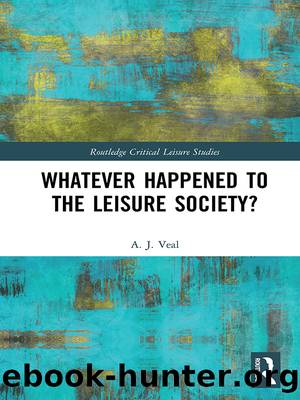Whatever Happened to the Leisure Society? by A. J. Veal

Author:A. J. Veal [Veal, A. J.]
Language: eng
Format: epub
Tags: Social Science, Sociology, General, Sports & Recreation
ISBN: 9781351972024
Google: WLJqDwAAQBAJ
Barnesnoble:
Publisher: Routledge
Published: 2018-10-10T00:00:00+00:00
Leisure society within society
In the historical narrative in Chapter 3, we noted the idea of a âleisure society within societyâ, including the elites of ancient Greece, Veblenâs notion of a âleisure classâ and Mumfordâs âCountry House societyâ. While the leisure society idea is intended to refer to all residents of modern societies, members of the leisure societies within society provide us with a glimpse of what a leisure society might be, or possibly should not be, in terms of lifestyle. They also reveal necessary conditions for a leisure society, namely a degree of material wealth, adjusted attitudes towards work and leisure, and the power to ensure that someone else, or something else, does the necessary work in society. Examples of such societies can also be said to exist in the modern era.
It has been suggested that retired people might be seen as a leisure society within a society. While there have always been some who were fortunate enough to experience a substantial period of retirement from work, it is only during the twentieth century that they have been sufficiently numerous to, possibly, constitute a society within society. This is due to substantially increased life expectancy, the advent of state old-age pensions and of more widespread superannuation schemes which have made the retired a significant active and independent demographic group. Michelonâs (1954) study, in which he refers to retirees as a ânew leisure classâ is an early example of an interest being shown in this idea. While expressing doubt about the cultural viability of a leisure society generally, Godbey (2006: 197â8) suggests that the lifestyles of the growing numbers of retired people demonstrate that a work-free existence is possible for some, given appropriate conditions. Ewald (1972: 163), in discussing the challenge of ordinary people adjusting to a life with substantially less work, referred to retirees as âpioneers into the society of the future â the leisure societyâ, who would âcontribute a living example of how to be free and thriveâ.
The economist John Kenneth Galbraith, in his most well-known work, The Affluent Society (1958/1962: 273), came close to the idea of a leisure society within society in his notion of the âNew Classâ. As noted above, he asserted that âthe greatest prospect we face ⦠is to eliminate toil as a required economic institutionâ. By âtoilâ he meant work which is âfatiguing or monotonous or, at a minimum a source of no particular pleasureâ (p. 274). He argued that this had, in fact, been taking place as a result of the growing significance of the New Class, basically the professional and managerial class who found pleasure, satisfaction and fulfilment in their work.
Download
This site does not store any files on its server. We only index and link to content provided by other sites. Please contact the content providers to delete copyright contents if any and email us, we'll remove relevant links or contents immediately.
| Coloring Books for Grown-Ups | Humor |
| Movies | Performing Arts |
| Pop Culture | Puzzles & Games |
| Radio | Sheet Music & Scores |
| Television | Trivia & Fun Facts |
Paper Towns by Green John(5175)
Spare by Prince Harry The Duke of Sussex(5174)
Machine Learning at Scale with H2O by Gregory Keys | David Whiting(4292)
Never by Ken Follett(3935)
Fairy Tale by Stephen King(3369)
Learning C# by Developing Games with Unity 2021 by Harrison Ferrone(3350)
Reminders of Him: A Novel by Colleen Hoover(3088)
The Man Who Died Twice by Richard Osman(3070)
Fantastic Beasts and Where to Find Them: Illustrated edition by J.K. Rowling & Newt Scamander(3012)
Will by Will Smith(2906)
0041152001443424520 .pdf by Unknown(2843)
How The Mind Works by Steven Pinker(2811)
Never Lie: An addictive psychological thriller by Freida McFadden(2574)
Fantastic Beasts and Where to Find Them: The Original Screenplay by J. K. Rowling(2506)
Rationality by Steven Pinker(2350)
It Starts With Us (It Ends with Us #2) by Colleen Hoover(2338)
The God delusion by Richard Dawkins(2305)
Borders by unknow(2301)
Friends, Lovers, and the Big Terrible Thing by Matthew Perry(2219)
